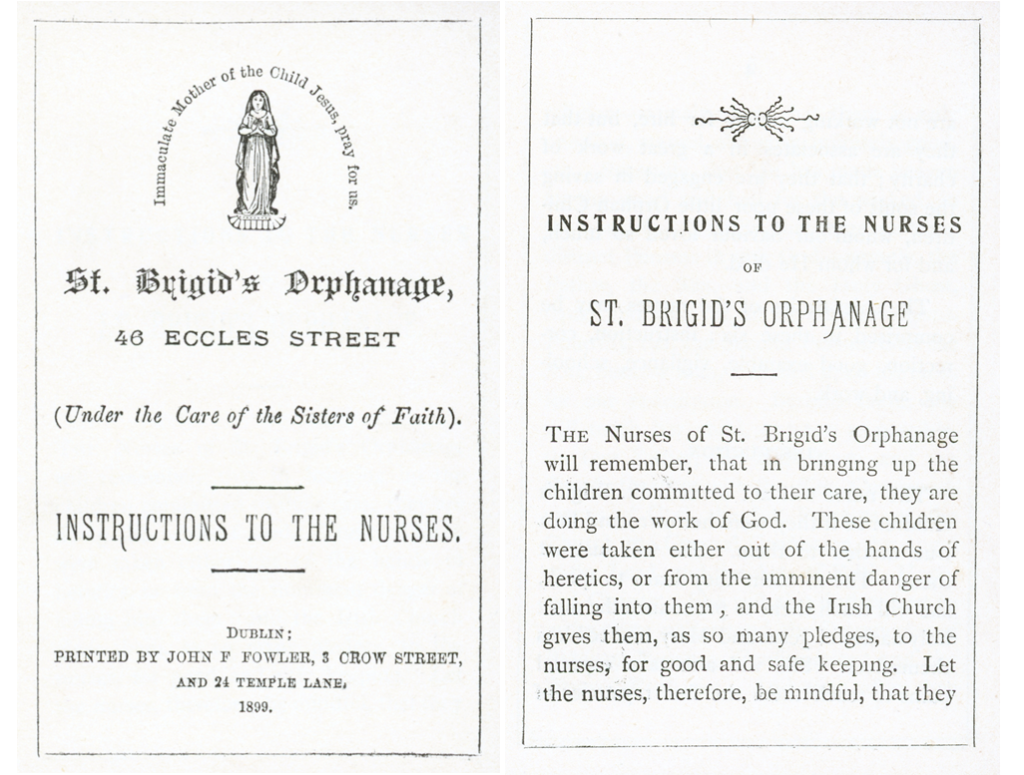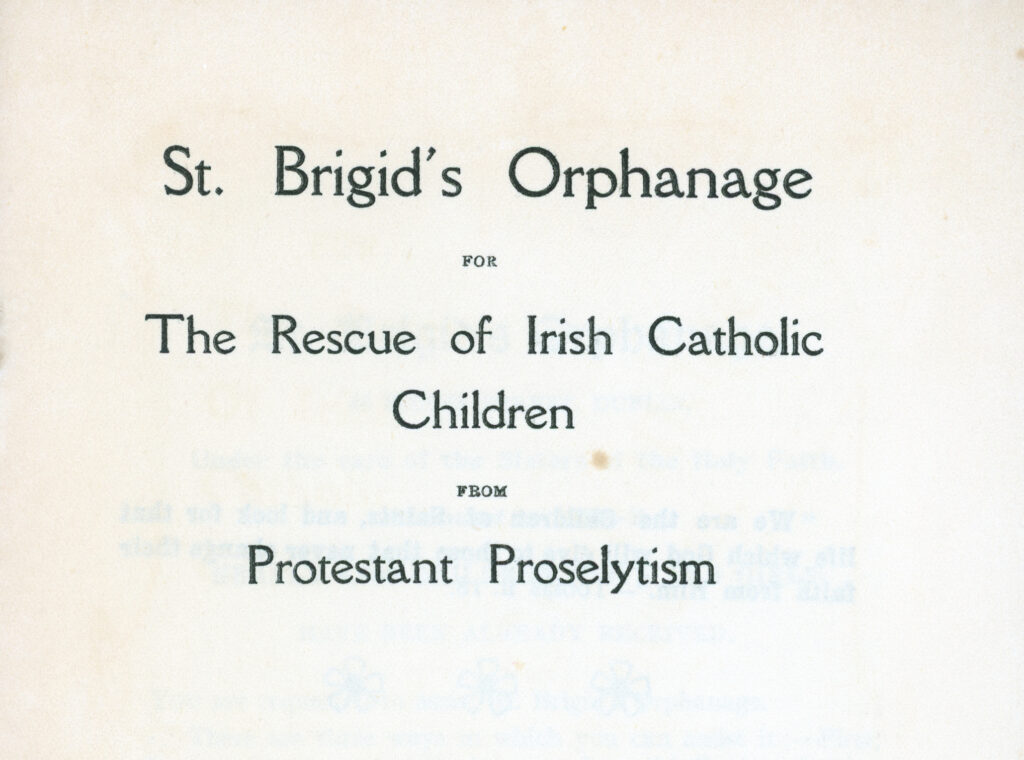About the Collection
This digital collection currently consists of a series of two Publications of St. Brigid’s Orphanage. It is envisaged that other publications may be added to this collection in the future, as part of an ongoing curatorial project.
St. Brigid’s Orphanage: Instructions to the Nurses (1899, 2nd Edition)
The Instructions to the Nurses is a supplemental guide, created by St. Brigid’s Orphanage, under the auspices of the Sisters of the Holy Faith and geared toward Nurses (foster parents). Nurses (foster parents) are the mainstay of the boarding-out system, incorporated by Margaret Aylward since the inception of St. Brigid’s Orphanage. This second edition evolved from the first edition, published in 1959. The first edition is also reprinted in the Thirty-First Annual Report of St. Brigid’s Orphanage (1887). The publication was written for and distributed to Nurses (foster parents) in order that they would adhere to a set of parenting guidelines: ‘The Nurses of St. Brigid’s Orphanage will remember, that in bringing up the children committed to their care, they are doing the work of God.’

The guide focuses on providing six instructions or ‘chief duties’ for Nurses (foster parents): Instructions, correction, good example, vigilance, schooling and work. Nurses are encouraged or incentivised, via premiums, to discharge their duties as set forth by these directives. Instruction includes reciting Roman Catholic prayers, knowledge of the sacraments and religious practices. Correction is considered a ‘principal’ duty, only bestowed upon by parents; used carefully and as a last resort, ‘no child of her own is to assume any authority, or attempt to strike, or otherwise punish St. Brigid’s child.’ Frequent slapping is prohibited and warnings of the same is a prerequisite. In the eventuality of a correction, it must be done in a quiet area, without anger or yielding to a child’s inappropriate behaviour. Leading by good example is explained to the Nurse with the maxim ‘Soft wax takes the impression of the seal.’ Nurses (foster parents) are forbidden from profanity, pilfering and intoxication.
Comparing the farmer tending his crop, likewise, Nurses are to tend to their children ‘continually.’ Productivity is encouraged as ‘there could scarcely be a greater evil than to make idlers of our poor children.’ Males and females are trained to assume different roles in society. Nurses are encouraged to accept orphans as their own; to foster Catholic teachings, create awareness of Protestantism, and provide appropriate ‘correction’ or corporal punishment. Nurses are provided with examples of maladaptive behaviours, expectations from education, and the recommended school-age, expected level of educational attainment. Overall, the booklet discusses the work of St. Brigid’s Orphanage, the boarding-out (foster care) system and the nurses (foster parents) living in the countryside; and affirms that nurses are not for hire but that they ‘are associates in a great work of Charity.’
St. Brigid’s Orphanage for the Rescue of Irish Catholic Children from Protestant Proselytism (1909)
This publication is penned by Fr John Gowan, for St. Brigid’s Orphanage (under the auspices of the Sisters of the Holy Faith). The booklet opens with a request for support and donations for St. Brigid’s Orphanage, via prayers, alms, and donations, with indulgences granted by various religious leaders. It notes that the orphanage was founded ‘for the purpose of rescuing Catholic Orphans and destitute children from the Proselytizers’. Examples of orphan ‘rescues’ are represented, and acknowledgements of a ‘net-work of proselytising institutions’. According to Fr Gowan, removing the Roman Catholic religion from children is a challenge ‘but it is not our first endeavour; all our efforts are directed toward it; controversy is the first lesson of the school, and the children become such first-rate controversialists that no one could answer them.’ Acknowledgement of the importance of education is considered ‘simple and limited’ as compared to what is needed when they [orphans] become adults. Attendance and accounts detailing premiums are assiduously tracked. ‘Light farm work’ for males and housework for females, is enunciated. Protocols for religious instruction and education, in general, is detailed.
The second part of the booklet is a reprint of the Annual Charity Sermon by Rev. Thomas Maher, S.J. The sermon encompasses subjects such as Proselytism, describing the Holy Faith Sisters as heroic, the Famine of 1845 and ‘black’ 1847, discrimination in employment, anti-Catholic quotes from various public figures, and an overall denunciation of the Protestant faith. The booklet further details how Protestant charter schools are condemned for its Catholic bigotry and Trinity College does not escape criticism either. Fr Gowan, describes Queens’ Colleges in a similar vein; referring to it as a ‘godless college.’ In the concluding pages, St. Brigid’s Orphanages is described as

‘carrying on saved from apostasy, saved from perversion to the Protestant Church; that Church that in England to-day, like the Post Office, or any other public institution, is a mere department of the State-its worship, its ritual, its articles of belief, its laws of marriage, it’s appalling facilities of divorce, that deplorable loosening of those moral moorings that hold the Christian family together’.
Collection Description
La Pina, Helena (2020) ‘Publications of St. Brigid’s Orphanage: About the Collection’, Holy Faith Digital Archive, available: http://hfsdigitalarchive.org/about-the-collections/sbo-publications/
